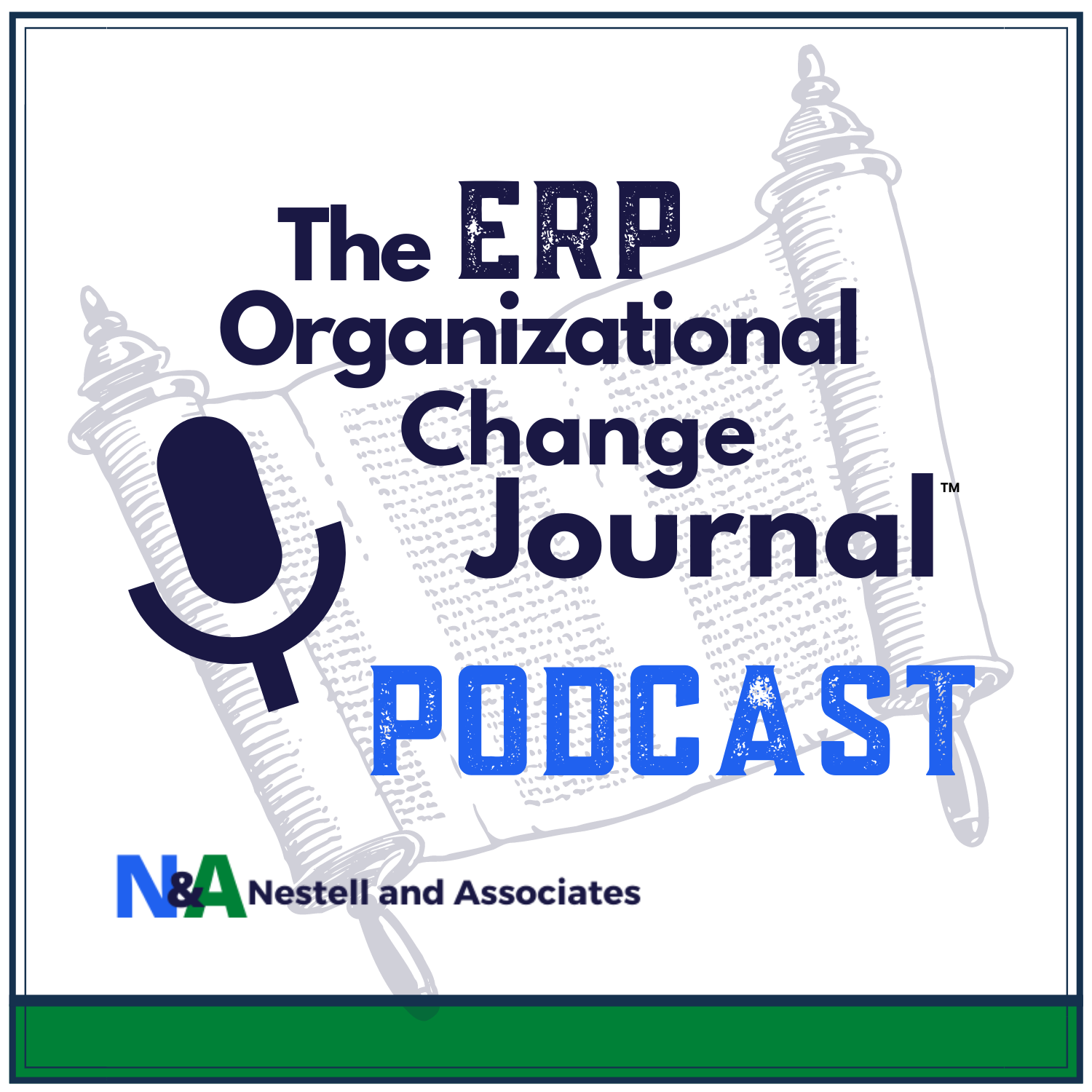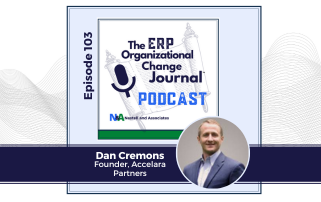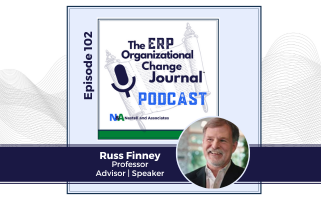About this Episode
In this episode, we explore ERP success with purpose-built networks. With our guest we will discuss factors that promote ERP organizational change success including Organizational Network Analysis (ONA), efficient collaboration, organizational culture, innovation, and trust, using networks to ensure alignment, collaborative dysfunction, and small shifts in how we connect can have a big impact on organizations, and more with guest Rob Cross! Join us to learn more about utilizing purpose build networks to advocate for ERP success.
More about Rob
Rob Cross, the Edward A. Madden Professor of Global Leadership at Babson College, is a renowned thinker, writer, and speaker whose category-defying ideas have influenced fields as diverse as organizational design, change, collaboration, teams, agility, innovation, and talent optimization.
Cross is the author of Beyond Collaboration Overload: How to Work Smarter, Get Ahead and Restore Your Well-Being.
He has authored six Harvard Business Review articles on practical approaches to enhancing collaboration and is the co-author of five books, including The Hidden Power of Social Networks.
Connect with Rob
- Website https://www.robcross.org/
More about this episode
For 20 years, our next guest has focused his research, teaching and consulting on applying social network analysis to critical business issues for actionable insights and bottom-line results. His work helps provide insight into the relationship, and value, of innovation, trust, organizational change and alignment, and talent optimization and leadership effectiveness towards organizational success.
We know that ERP and organizational change research suggests significant and common denominators highly relevant to ERP Organizational change success, for example, we know that:
- Leaders inspire and encourage innovation and creativity, encourage stakeholders to analyze problems from many different viewpoints, inspire employees to collaborate, and that alignment is significant to success.
- A corporate culture that is accepting of conflicts and builds trust promotes creativity and innovation.
- Executives and organizations may benefit in effectively applying sound research to practice. (As in the case with our next guest for example)
- Well thought out and disciplined ERP organizational change process and strategy is critical
- Placing a great deal of value on understanding the culture of the company and emphasizing the value of teamwork, providing individuals proper resources, trust-building, and encouragement are also critical and often understated.
And there are many more notions, common themes, and success influences as suggested by research, anecdotal evidence, case study, and combined experiences. But how can we accomplish these notions tactically and practically?
What we also know is that the insight provided from Rob’s work can have significant impact on EP organizational change. Let’s learn more about these points from our next guest!
Stream this Episode Here and Subscribe on all Major Platforms
We want this podcast to be the most useful podcast you listen to. And we need your help! Please leave us a podcast review!
Episode Highlights
04:15 Your research, work, and practice include sharing ways in which Organizational Network Analysis (ONA) enables cultural change. In fact, you state in your blog “How Organizational Network Analysis (ONA) enables cultural change”, You state that “Most culture transformations begin top-down, but culture is experienced locally in networks. More successful culture-change efforts use organizational network analysis to drive diffusion of desired values and behaviors deep into an organization.“ In that case, ONA sounds like a pretty significant “thing”. Clearly, Rob, you study Organizational Network Analysis (ONA) and social network analysis? Can you explain more about what this means exactly?
09:36 You share in your work that if an organization wants to be high-performing, they need to act on trust, purpose, and energy. How do you leverage Organizational Network Analysis (ONA) to do that exactly? That is, how do you use ONA to take tactical action?
15:36 In your work, you discuss an interesting idea that perhaps many people don’t consider and that is the idea of managing the network, not just the team or unit. Why is this notion so important to organizational success?
18:54 In your blog “A Brawl Not a Ballet” you state that “Successful people are typically 18-24% more efficient in collaborations than their peers. They reclaim this time – almost a day a week – by structuring their work differently, managing personal biases to collaborative work, and engaging efficiently across collaboration platforms.” Who wouldn’t want to be 24% more efficient! Can you share more on how tactically, successful people do this?
23:01 I would like to revisit the idea we touched on earlier, the idea of organizational culture and cultural change. In your article “Spark Networks of Innovation with a Culture of Trust” you share that “For innovation to happen, people need to feel safe to speak up, ask questions, admit they don’t know and contribute ideas. More effective leaders create cultures of trust to promote the collaboration and risk-taking needed to spark innovation.” How is this statement related to ONA and networks and what tactically do you need to do? That is, to create this network of trust
26:39 How can you leverage networks to be a “Ten Percenter”? That is in your article, “The Secret of Ten Percenters”, you explain that “People that score higher on measures of career satisfaction, well-being and resilience develop specific connections inside and outside of their work. Proactively cultivating these relationships pays off in the form of physical health as well as experiencing greater growth, purpose, and resilience in life.”
32:42 How exactly can you leverage networks to ensure alignment within your organization? Let me also ask another way, what has your ONA taught you about leveraging your network to endorse organizational alignment?
34:28 In your article, “6 Types of Collaborative Dysfunction—and How Teams Can Do Better” you discuss how groups can “morph into predictable patterns of collaboration that undermine performance if collaboration is not purposefully managed. More successful teams avoid or correct 6 common network patterns that cause lackluster performance or failure.” 1. Hub and Spoke, 2. Disenfranchised Nodes, 3. Misaligned Nodes, 4. Overwhelmed Nodes, 5. Isolated Networks, 6. Priority Overload” I know this is a loaded question and a lot here, and we will leave it up to our listeners to check out the full article, but can you share just one type and example of collaborative dysfunction that you share in this article?
38:45 I am a big believer that consistently accomplishing the smaller things is critical. I apologize I forgot the article title, but you shared how ”Small shifts in how we connect and collaborate can have a big impact on individuals, teams, and organizations”. How so and how do you do that?
42:24 Rob, as fellow practitioners, we absolutely benefit from learning from our colleagues and friends, both “boots on the ground” as well as researchers. How would you summarize this conversation? That is if you had to distill your work into 3 or 4 sentences, what would you say to ERP organizational change practitioners?
More Related Episodes from TheERPocj & Blog Posts
Episode 52: ERP Organizational Change Success: Leadership and Management with guest Todd Dewett
Episode 46: ERP Organizational Change: Process, Practice, and Management with guest David Amborski
Episode 37: Learning and Development and Human Performance Technology and its Return on Investment with guest Dr. Tim Brock
Episode 20: Winning the ERP Game with guest David Stefanick
Episode10: https://nestellassociates.com/podcast/episode-10-leadership-myths-behaviors-and-practice/ with guest Dr. Gary A. DePaul
Navigating ERP Transformation: Strategies for Success
Successful ERP Implementation: 12 Critical (But Not So Common) Tips
Latest Episodes
Human Capital in PE-Backed Companies: Strategies for Leadership and Talent Management
Human Capital in PE-Backed Companies: Strategies for Leadership and Talent ManagementEpisode Overview - PE-backed Human Capital Strategies Today’s episode centers on the pivotal role of human capital in PE-backed companies, emphasizing how strategic leadership and...
ERP Organizational Change: Technology Strategy
ERP Organizational Change: Technology Strategy and Keys to SuccessEpisode Overview - Technology Strategy In general, at the highest level of categorization, there seems to be consensus on the importance of people and culture, informational technology, and project...
AI and Private Equity Synergy: Fueling Business Transformation
AI and Private Equity Synergy: Fueling Business TransformationEpisode Overview - AI in PE Strategies In this episode, we explore how AI and Private Equity synergies are fueling business transformations and reshaping investment strategies and operational efficiencies....






0 Comments